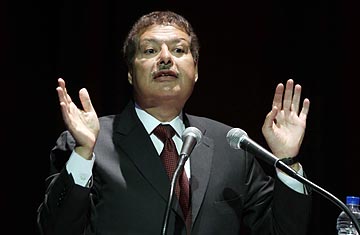
Chemistry Nobel Prize laureate of 1999, Egyptian professor Ahmed Zewail speaks during a symposium held in the Opera house in Cairo, Egypt, February 13, 2010.
Mohamed ElBaradei is not the only Nobel Prize winner who has entered Cairo's political fray. While he is the more prominent of the Nobelists involved, ElBaradei has company — Ahmed Zewail, 64, an Egyptian-American professor at the California Institute of Technology. Zewail was the recipient of the Nobel Prize for chemistry in 1999 and was President Barack Obama's special envoy for science to the Middle East.
He arrived in the country of his birth earlier in the week, and has already met with newly appointed vice president Omar Suleiman ("we listened to each other," Zewail said at a press conference on Sunday). Zewail has also conferred with Sheikh Ahmad Tayeb, the head of the influential Al Azhar Sunni religious institution as well as Arab League Secretary General Amr Moussa, who is emerging as a potential alternative to President Hosni Mubarak. Zewail also spent several days in Tahrir Square to gauge the sentiment of the youth leaders who have brought Hosni Mubarak's almost 30-year reign to the brink of collapse.
"I am optimistic," Zewail said on Sunday at his first press conference since returning to Egypt. He has volunteered his time and his standing to help break the deadlock between anti-government protesters adamant that Mubarak must relinquish power now, and a regime demanding a months-long transition. He outlined a five-point plan that he is confident will help break the deadlock. It entails forming a "council of wise men and women" to oversee the process of amending the constitution; revoking Mubarak's emergency rule; freeing political prisoners; holding free and fair elections; and allowing press freedom.
Like ElBaradei, Zewail, a mild-mannered mustachioed scientist, has been suggested as a possible presidential candidate, but unlike ElBaradei, it's a mantle he rejects. "Trust me, there are a number of Egyptians who are qualified that you don't even know about," he said. He cautioned against outside, specifically American, interference in the political crisis, saying that the change "must be done by Egyptians because the problems are Egyptian problems."
More diplomatic than the retired diplomat ElBaradei, Zewail appeared to step back from his demand, outlined in a New York Times op-ed piece this week, that Mubarak step down immediately, a key point ElBaradei has been pressing. "Your culture is different from this culture," Zewail said Sunday. Still, he said he was confident that if "clear evidence" could be provided to the youth in Tahrir Square that the political system is being reformed, "a lot of young people will let [Mubarak] serve out his term."
That, however, is the key sticking point between the two sides. Senior Muslim Brotherhood leader Mohammed Mursi, who held unprecedented talks with Suleiman on Sunday, told al-Jazeera that the vice president was insisting that Mubarak serve out his term. But Mursi said that doesn't mean the talks are over. "This is just the beginning of dialogue, and we are with the people's demand that Mubarak step down."
Zewail said that Mubarak has the historic opportunity to become "the first president of the largest Arab country in the Middle East to hand over power to another leader." But it remains to be seen if the 82-year-old views his predicament as an opportunity. It also remains to be seen if Zewail has the pull to persuade the various sides to reach a compromise. If ElBaradei is considered a parachutist by some Egyptians, dropping into Cairo from his Viennese domicile to assume the mantle of opposition leader, Zewail is perhaps even more of an unlikely politician. But then again, he's not overtly maneuvering for a place in the Presidential Palace or the Cabinet. PBS's Margaret Warner, who interviewed Zewail recently, said that it was "like sitting in public with Bono and Einstein combined," given the number of well-wishers who greeted the sprightly scientist during her interview.
For now, Zewail is concentrating on his unofficial role as mediator. "We just need to get out of this serious problem for Egypt," he said. "I speak only as an Egyptian who is concerned about what is going on in his mother country."
